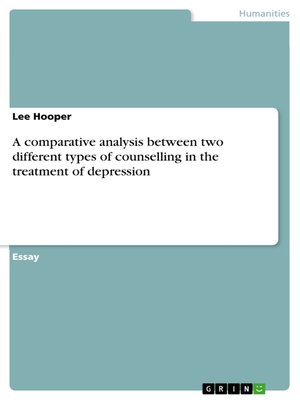A comparative analysis between two different types of counselling in the treatment of depression
ebook
By Lee Hooper

Sign up to save your library
With an OverDrive account, you can save your favorite libraries for at-a-glance information about availability. Find out more about OverDrive accounts.
Find this title in Libby, the library reading app by OverDrive.



Search for a digital library with this title
Title found at these libraries:
| Loading... |
Essay from the year 2011 in the subject Psychology - Consulting, Therapy, grade: 1, Massey University, New Zealand, language: English, abstract: With the ever-growing increase of psychological disorders in modern society, cognitive-behavioural therapy has evolved as of the most accepted and mainstream approaches throughout the Western world. In accordance with the need for an ever-growing variety of treatment types – to attend to the different needs of individuals – there has been a steady evolution of relatively new theories for the treatment of psychological disorders. One that has found particular attention in the area of postmodern approaches is compassion-focused therapy. Although both approaches are beneficial in the treatment of psychological disorders, compassion-focused therapy may have an advantage over cognitive-behavioural therapy as it provides a more concrete unification between logical thought and feelings. This is mainly through its central application of giving compassion to the client as the foundational work to therapy. To illustrate this point, both theories will be outlined and then compared and contrasted around the theme of depression since this is a prevalent issue and one that is considered to be the domain of cognitive-behavioural treatment, with a demonstrative outcome of how the differences between the two approaches can play a significant role in successful treatment. Compassion-focused therapy has the potential to be therapeutically more effective in treating depression, providing the client is ready to accept going beyond challenging their logical thinking and behaviour; ready to allow compassion in their life, and to be aware of how to balance their physiological regulatory systems.






